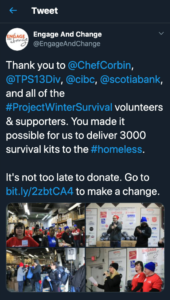Instagram, LinkedIn, Facebook, TikTok, X (formerly Twitter)—it’s hard to find a social media platform that doesn’t use hashtags. More importantly, how can you start using branded hashtags on social media to leverage your business and drive traffic?
Hashtags, expressed with a “#” symbol before a word or phrase, are ways to group your social media content with other similar content in order to get your post discovered by more people.
Some hashtags, like #business on LinkedIn or #food on Instagram, are what we call generic hashtags. They’re used by a lot of social media users in a lot of posts. Generic hashtags give you a sense of the topic the social media post is about, but it doesn’t go much further than that.
Unique hashtags are a class of hashtags that are only used in very specific circumstances. For example, #HealthyFoodForKids and #BusinessGoals2025 are more specific variations of #food and #business.
What about branded hashtags? These are hashtags that are created for a specific purpose. While a general hashtag like #business can refer to just about anything business-related, a branded hashtag like #ShareaCoke is much more focused—it’s tied to a specific business and is part of a specific marketing campaign.
While individual social media users and brands typically use generic and unique hashtags in their posts, brands can benefit greatly from creating and using their own branded hashtags.
Learn about creating your own social media hashtags
-
Why create your own branded hashtag for your brand?
-
How to create an effective unique hashtag
-
Expert advice on creating your own branded hashtag
For brands, creating your own branded hashtags allows you to generate buzz around a marketing campaign. In turn, this can bring traffic to your social media content and website, or help you reach your business goals, such as driving more sales.
Don’t believe us? Take a look at our award-winning marketing campaign for Engage and Change, a nonprofit organization raising awareness about homelessness during the wintertime. Our unique hashtag for their campaign, #ProjectWinterSurvival, trended #1 in Canada and received over 13 million impressions.
Why should you create a branded hashtag?
- It establishes credibility and helps set you up as an authority on a specific subject, especially if most of a hashtag’s content points back to your social media page.
- You become the leader instead of a follower. Social media users love engaging with original, creative content.
- If you are setting the hashtag trends, users will be more likely to share your content on their feeds or with their friends. This helps your brand tap into thousands of new social media users who can then turn into followers.
- You can drive and steer conversations related to your business. Hashtags are useful for community management and can help you connect more effectively to your audience.
- Branded hashtags help digital marketers manage and keep track of a campaign. For example, if users must make a post and use the branded hashtag to enter a giveaway, the hashtag allows marketers a convenient way to view all the submitted content.
How to create an effective hashtag in three easy steps
Step 1: Start with a clearly defined purpose and strategy for your branded hashtag.
Whether you’re having a contest on Instagram or hosting a live video discussion on LinkedIn, you’ll want to generate buzz and get people to participate. Creating your own unique hashtag tied to an event or campaign will let other social media users easily find your content. Depending on your objectives, you may want to promote the unique hashtag to your audience before launching your campaign as a way to drum up interest and excitement.
Step 2: Create a list of potential branded hashtags and research them.
You might find it easier to first look at other successful marketing campaigns that use branded hashtags. Some examples include lululemon’s #TheSweatLife, Herschel’s #WellTravelled, and Red Bull’s #PutACanOnIt.
Once you come up with a list of potential hashtags for your own marketing campaign, be sure to research each of them and get other people’s feedback as well. If your branded hashtag is already being used and it’s not content that you want to be associated with your campaign, try a different hashtag.
Also, do deep in mind that some social media platforms don’t support hashtag capitalization! #SusanAlbumParty may be properly capitalized on one platform, but on another, it may show up as #susanalbumparty.
Step 3: Launch your own branded hashtag.
After you’ve selected your hashtag, use it in social media posts where it makes sense to do so. For example, if your branded hashtag is tied to a specific marketing campaign, use it in posts that mention the campaign. If your hashtag is more general, like your company name, use it sparingly in posts that are more promotional or posts that mention your brand specifically.

Learn how we used a unique hashtag, #ProjectWinterSurvival, in our award-winning campaign.
Here are some examples using our own digital marketing agency, Spark Growth:
#SparkSummit2024: In this scenario, we’re promoting a future online Q&A session featuring our healthcare marketing specialists. This hashtag uses part of our branding (i.e. “Spark”) and a timeframe (i.e. 2024). One way to leverage this branded hashtag is to use it in all posts promoting the event (e.g. “Sign up for the upcoming #SparkSummit2024 where our healthcare marketers answer your questions!”).
Another way to drive interest is to use branded hashtags to generate user-generated content. For example, in one social media post, we could ask other users to create their own posts. They can include the branded hashtag and share questions they want our marketers to answer. By including our branded hashtag in their post, our team monitoring the hashtag can easily track their posts by searching for #SparkSummit2024.
#SparkGrowth: Sometimes, a branded hashtag can be as simple as your business name! Use these hashtags when you’re sharing branded content, such as linking to your Services page on your website or when you’re sharing a testimonial from one of your customers. For example, in this LinkedIn post, we share branded content linking to a digital marketing guide on our website. Connecting your branded hashtag to engaging, educational content can help elevate your thought leadership and position your brand as an expert in your industry.
Our Expert Advice on Creating and Using Hashtags!
Give it a chance. Some hashtags will catch on quickly and others will take time. If you used a hashtag during a marketing campaign and it never took off, look at reasons why this may be the case. Was it too similar to other hashtags? Was the hashtag too long and hard to use? Did you promote it often enough on your feed?
Keep your branded hashtag simple. After all, you want your audience to easily remember it when they’re searching for it on social media or using it in their own posts. Our hashtag for Engage and Change, #ProjectWinterSurvival, was the name of the marketing campaign itself so it was easy to remember.
Don’t overuse branded hashtags. In other words, you shouldn’t be using it in every single post, especially if the hashtag is just your business name. This can unintentionally get your content flagged as spam.
Branded hashtags can be used in many different places. If you’re posting on Instagram for example, consider using your hashtag in a Story, as the title of a Story Highlight, or even in a comment response if it’s appropriate.
Of course, creating a branded hashtag is just one part of the wider digital marketing puzzle. If you’re looking for ways to use social media to increase brand awareness or generate leads, let’s have a conversation! Click the button below and chat with one of our social media marketing experts and learn how today’s top social media platforms and other digital channels can help you reach your business objectives.
While hashtags seem simple to create and use, there’s actually a lot of strategy that goes with them. For your next marketing campaign, make sure that you’re using the right hashtag the right way. Click the button below to chat with our social media marketing experts today!


